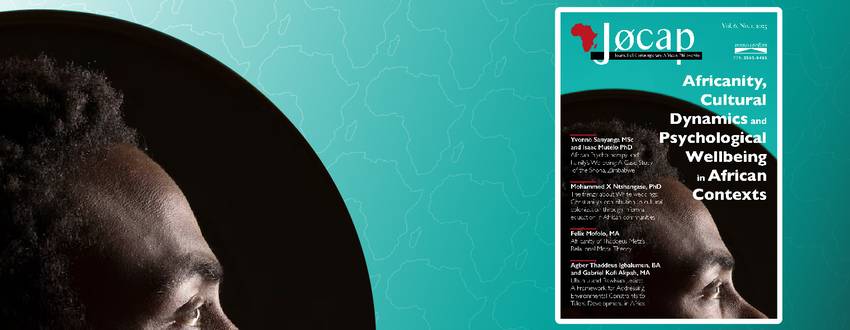News
HEALING, TEACHING, REFLECTING: THE WEALTH OF AFRICAN PRACTICES IN TODAY’S WORLD

7 april 2025
The Journal of Contemporary African Philosophy (JOCAP), published by Domuni Press, returns with a powerful new issue (Vol. 6, No. 1, 2025) dedicated to the intricate intersections of culture, identity, and psychological well-being in African societies. With contributions rooted in philosophy, moral theory, religion, education, and environmental concerns, this issue illuminates how African worldviews and practices serve not only as cultural heritage but also as dynamic frameworks for fostering individual healing, family cohesion, and social development.
The current issue brings together voices from Zimbabwe, South Africa, and beyond, offering a timely philosophical reflection on how African traditions, values, and ethical systems can enrich contemporary discourse and practice. From indigenous psychotherapy to moral theory and from religious dynamics to talent development, the articles speak with urgency and depth to the challenges and opportunities facing African communities today.
Reclaiming Indigenous Healing: African Psychotherapy and Family Well-being
The opening article, “African Psychotherapy and Family’s Wellbeing: A Case Study of the Shona, Zimbabwe” by Yvonne Sanyanga and Isaac Mutelo, revisits the foundations of African traditional counselling—rituals, herbal remedies, spiritual practices, and communal engagement—and demonstrates their continued relevance in promoting mental health. Focusing on the Shona people of Zimbabwe, the authors argue that indigenous psychotherapy is inherently relational, engaging not only the individual but also their family, ancestors, and broader community.
Their analysis critiques the Eurocentric model of therapy, which isolates the client, in contrast to African approaches that emphasize integration and collectivism. In this worldview, wellness is not an isolated pursuit but a communal effort. By calling for the formal recognition of African healing methods within mainstream healthcare, the authors underscore the importance of cultural identity and belonging in therapeutic practice.
Christianity, Cultural Colonization, and the Loss of Identity
The next contribution, “The Frenzy about White Weddings: Christianity’s Contribution to Cultural Colonization through Informal Education in African Communities,” by Mohammed Xolile Ntshangase, explores how Western Christian rituals, especially white weddings and funerals, have supplanted traditional African rites, subtly perpetuating colonial mentalities. The author uses the concept of “self-colonisation” to describe the internalized rejection of African cultural forms in favor of Western norms.
Ntshangase challenges African Christian communities to reflect critically on the cultural imports they have embraced, suggesting that true decolonization requires a spiritual as well as intellectual re-evaluation. The piece raises vital questions about religion, cultural identity, and the need for an Afrocentric reorientation.
Towards an Authentic African Moral Theory
In a significant philosophical contribution, the article “Africanity of Thaddeus Metz’s Relational Moral Theory” revisits one of the most discussed frameworks in African ethics. Metz’s Relational Moral Theory (RMT) is assessed in light of African metaphysics, spirituality, and communal values. While Metz aims to make his theory globally relevant, the article argues that detaching it from its metaphysical roots weakens its African authenticity.
The authors advocate for a moral theory that is ethical, contextual, complementary, and relational—principles deeply embedded in the African concept of Ubuntu. This relational ethic integrates spiritual, cultural, and communitarian dimensions to offer a richer and more holistic moral framework.
Environmental Constraints and the Development of Talent
The article “Ubuntu and Rawlsian Justice: A Framework for Addressing Environmental Constraints to Talent Development in Africa” turns to issues of social justice, arguing that poverty, pollution, and lack of access to education hinder the development of children’s talents. By combining Ubuntu ethics with John Rawls’s theory of justice, the authors offer a compelling model for reducing inequality and supporting human flourishing.
They move beyond economic frameworks to engage with deeper ethical questions: What kind of society does Africa aspire to be? How can traditional values guide modern policy? Their proposed model charts a path toward inclusive development rooted in community care and moral responsibility.
A Tapestry of African Thought and Practice
Together, these articles form a rich tapestry of philosophical, therapeutic, and cultural insight.
What unites them is a shared commitment to seeing African culture not as a relic of the past but as a living resource for shaping the future.
JOCAP’s editorial board—composed of leading African scholars—continues to position the journal as a vital platform for the renewal of African philosophy. The journal affirms its dedication to academic excellence, critical inquiry, and the common good.
A Journal with a Mission
JOCAP is committed to bringing African philosophy into conversation with global debates, grounded in the lived realities of African societies. This issue embodies that mission by showing how indigenous knowledge, ethical reflection, and philosophical clarity can contribute to societal transformation.
At a time of global uncertainty—marked by mental health crises, environmental degradation, and identity struggles—the insights in this issue are both timely and necessary.
About JOCAP and Domuni Press
The Journal of Contemporary African Philosophy is a peer-reviewed academic journal published three times a year by the Dominican Vice Province of Southern Africa, in collaboration with Domuni Universitas. It seeks to amplify African philosophical voices through critical and future-oriented scholarship.
Domuni Press, the academic publishing house of Domuni Universitas, oversees the entire editorial process of the journal, from peer review to layout, publication, and distribution, in both print and digital formats. By doing so, Domuni Press ensures that high-quality, Africa-rooted research reaches a broad international audience.
The new issue (Vol. 6, No. 1, 2025) is available at: https://journal.domuni.eu
